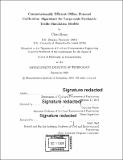Computationally efficient offline demand calibration algorithms for large-scale stochastic traffic simulation models
Author(s)
Zhang, Chao, Ph. D. Massachusetts Institute of Technology
DownloadFull printable version (18.66Mb)
Other Contributors
Massachusetts Institute of Technology. Department of Civil and Environmental Engineering.
Advisor
Carolina Osorio.
Terms of use
Metadata
Show full item recordAbstract
This thesis introduces computationally efficient, robust, and scalable calibration algorithms for large-scale stochastic transportation simulators. Unlike a traditional "black-box" calibration algorithm, a macroscopic analytical network model is embedded through a metamodel simulation-based optimization (SO) framework. The computational efficiency is achieved through the analytical network model, which provides the algorithm with low-fidelity, analytical, differentiable, problem-specific structural information and can be efficiently evaluated. The thesis starts with the calibration of low-dimensional behavioral and supply parameters, it then addresses a challenging high-dimensional origin-destination (OD) demand matrix calibration problem, and finally enhances the OD demand calibration by taking advantage of additional high-resolution traffic data. The proposed general calibration framework is suitable to address a broad class of calibration problems and has the flexibility to be extended to incorporate emerging data sources. The proposed algorithms are first validated on synthetic networks and then tested through a case study of a large-scale real-world network with 24,335 links and 11,345 nodes in the metropolitan area of Berlin, Germany. Case studies indicate that the proposed calibration algorithms are computationally efficient, improve the quality of solutions, and are robust to both the initial conditions and to the stochasticity of the simulator, under a tight computational budget. Compared to a traditional "black-box" method, the proposed method improves the computational efficiency by an average of 30%, as measured by the total computational runtime, and simultaneously yields an average of 70% improvement in the quality of solutions, as measured by its objective function estimates, for the OD demand calibration. Moreover, the addition of intersection turning flows further enhances performance by improving the fit to field data by an average of 20% (resp. 14%), as measured by the root mean square normalized (RMSN) errors of traffic counts (resp. intersection turning flows).
Description
Thesis: Ph. D. in Transportation, Massachusetts Institute of Technology, Department of Civil and Environmental Engineering, 2018. Cataloged from PDF version of thesis. Includes bibliographical references (pages 168-181).
Date issued
2018Department
Massachusetts Institute of Technology. Department of Civil and Environmental EngineeringPublisher
Massachusetts Institute of Technology
Keywords
Civil and Environmental Engineering.